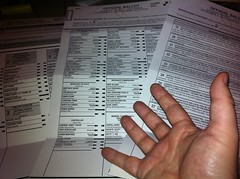Here’s another one of my topical reaction pieces—you could even call it a column—that originated as a comment or two on the Washington Post website. Edited 3/21/2020 because life.
Electability is specious and spurious. Many (maybe most?) candidates declared “electable” have gone on to lose – so what does it mean anyway? It’s a flawed second-level measure. It’s abstract, amorphous, and self-fulfilling. It’s entirely too cute.
Let’s keep it simple. Voters should feel free to judge the candidates on temperament, personality, platform, perceived effectiveness, and so on. (Maybe the media should encourage that.) True electability is only determined after the fact by the actual vote. The electability frame does not help us get the best candidate.
My suggestion to voters: Vote (and caucus) for who you most want to be President.
Electability will sort itself out.
Don’t overthink it. Vote for who you most like. The one with the most votes wins (your state’s nomination [probably]). It’s that easy.
The person who gets the most votes is the person who the most people want. That’s the only way to truly determine “electability.” It’s impossible to predict before the fact. Why else would so many “serious candidates” run?
Just vote for who you like best. Yes, there will be people who abdicate their responsibility to make a choice between bad and worse. That’s fine. As long as we end up with a candidate who is capable of turning out enough voters not only to vote against Trump but to vote for them in November, that’s all that matters.
I also wonder this. Why do people think that what would result from a Warren or a Sanders presidency would actually be what they plan? How has that worked for any President?
I’m irritated with the constructed narrative that the Democratic Party is driving people away because it’s too far left. It’s simply not true. In my lifetime, Democratic Presidents have ALWAYS governed from the middle. What is the middle, anyway? It’s moved farther and farther right as the Republicans have moved the Overton window over and over again. I’m thankful for our current crop of candidates and elected official who are proud social democrats or even (gasp) socialists. They’re moving us back in the right (er, left) direction. And, as polls have repeatedly shown, they are actually in the mainstream of public opinion.
People who subscribe to the electability argument apparently believe they can predict what is going to happen between now and November, or what the majority of the voters want, or who is going to actually turn out. They expect those of us who believe that there should be a social safety net and reasonably-priced health care (you know, like the rest of the civilized world) to settle for the “safe” moderate who will please no one and either lose or win and get nothing done. I reject that demand. How did being President work out for John Kerry? Or Hillary? The “safe” candidate is anything but.
We need someone who will inspire people, who people like. My belief is that most Americans don’t vote for President based on which candidate most closely matches their positions on all the issues of the day. They vote for who they like better.
Everything changes in the general election, of course. I don’t care if it’s Senator Warren or Bernie or Senator Klobuchar or Mike Bloomberg or Mayor Pete or Vice-President Biden. No matter what, I’m voting for (and getting completely behind) that person. Obviously I have a preference, but any of them would be better than the current occupant of the Oval Office.
The fact is that the Republican Party is going the way of the authoritarian and, regardless of who the Democratic nominee is, the only responsible thing to do if you are a citizen who values democracy is to vote for that person.
I can live with incrementalism if it’s going to replace insanity.




